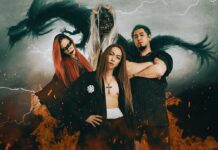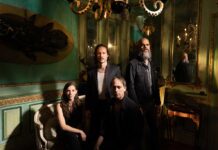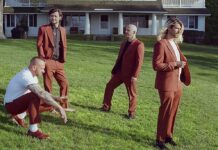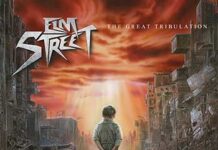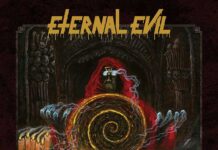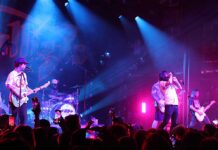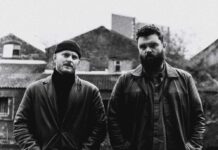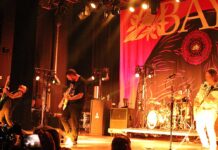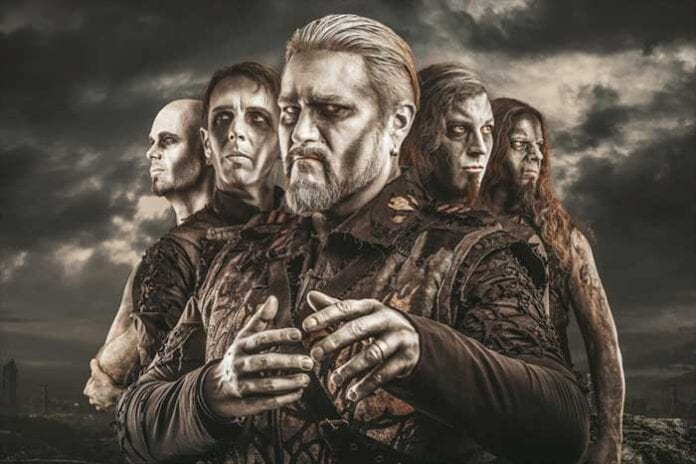
INTERVIEW WITH MATTHEW GREYWOLF
BY KEVIN STEWART-PANKO
PHOTOGRAPH BY MATTEO VDIVA FABBIANI
If you’re just stumbling across the name Powerwolf in 2021, the ornately adorned German troupe may have appeared to come out of nowhere to great acclaim and rocket boosted to overnight success via a loose gimmick and a truck load of pyrotechnics. To the contrary, as longtime fans decked out in the ghoulish face paint and post-apocalyptic duds mimicking their heroes will tell you, the band has been plying their sugary confection of traditional Teutonic metal stomp, crinkly forehead power metal melodies, and high-brow classical orchestration since 2004.
All along the way, the Saarbrücken based quintet has been hammering mainland Europe over the head with a seemingly endless barrage of releases, their latest being 10th album Call of the Wild, which follows in the footsteps of last year’s “Best Of” album, Best of the Blessed. The album’s cover screams power metal gussied and oiled up to the gills with its 11 songs bouncing between anthemic fist bangers, party anthems, and battle cries, all of which designed to rule festival stages across the Old World and beyond with tales of ancient legends, creatures, myths, and ribaldry.
We caught up with guitarist Matthew Greywolf [née Benjamin Buss] to discuss the unexpected fulfillment of rock star fantasies, staying ahead of the lockdown blues, and how, once the world gets its head on straight, Powerwolf is planning on bringing their neon dark and lyrically opulent power metal to a venue near everyone.
Did you ever think about what you would do if you got as popular as you are today? Or did things just happen, and you’ve been making it up as you’ve been going along?
It’s more of the latter. Of course, when you found a band, you one day dream of playing big stages, being popular, and being able to release albums that a lot of people are waiting for. But, once you get into doing stuff, you’re so busy that you never get a chance to think about what you’re doing. The one thing we knew when we founded the band was that we wanted to achieve some kind of experience that goes beyond music, like having an exciting visual side to things, and we went all the way with that. That’s what we did from the beginning, when we used makeup despite a lot of people telling us, “C’mon, you’re a melodic metal band! Why do you use makeup and stuff?” We just do what we do. There was no master plan on how to achieve anything. If I had this plan, I would obviously be a very rich person. We’ve been very busy sticking to our vision and, luckily, success came, but it’s not something you can plot.
“THE ONE THING WE KNEW WHEN WE FOUNDED THE BAND WAS THAT WE WANTED TO ACHIEVE SOME KIND OF EXPERIENCE THAT GOES BEYOND MUSIC”
As you’ve expanded the orchestral element of your sound, have you gone back to study orchestration formally or take lessons on how to write and read charts?
Well, despite me being the guitar player in the band, the instrument I learned on and learned in a very classical way is the church organ, and the same thing goes for Falk Maria Schlegel [keyboards, née Christian Jost]. Both of us have our classical educations. Orchestration is, of course, something different, but we actually learned playing from charts and the theoretical side of things, but in our teenage years we turned down things like that and became metalheads (laughs). Nowadays, we’ve unified both of those worlds.
How were the new record and Best of the Blessed affected by COVID? Was Call of the Wild delayed and Best of the Blessed released as a COVID stopgap?
No, nothing like that. Both the “Best Of” album and Call of the Wild were scheduled as they’re happening right now. The rerecordings for the “Best Of” album we actually did in spring of 2019, and for Call of the Wild, we had just stopped touring for the previous album right when the first lockdown happened. We played our last show in Mexico City on the 15th of March 2020, got back to home ground on one of the last planes, and from then on the plan was to write the next album over the rest of the year anyway. We had some good luck with our schedule, at least until now (laughs). Concerning our schedule, COVID did not affect anything, same thing artistically and musically. Pretty early on, when the pandemic situation was clear and we went into lockdown, we decided as a band that we’d refuse to let these things invade the creative universe. I feel pretty grateful for having the opportunity to keep myself busy writing an album in 2020. It was really a way for me to escape what was happening around me, the daily news, and stuff by going into the studio and writing the album. If there was any affect on the songwriting, it was that we had all that time to focus on the album.
Did having that extra time allow you to do anything different, like experiment with new elements or analyze the music on a deeper level?
I wouldn’t say that we’re ever over-analyzing stuff, as I’m convinced that doesn’t help the song. If you have a song and it works well, then you should give it the most spontaneous feel it can have. In the actual studio recordings I always try to bring in the same enthusiasm as the first time you played the song. That’s what sometimes makes the moment. It was rather that we enjoyed that we didn’t have to rush through things. Maybe we took a little more time playing with stuff that might have been a dead end street. In the past, it was more like, “Let’s not waste time on things that won’t work.” For the new album, it brought in some fresh elements that wouldn’t have happened in that way if we didn’t have the whole focus.
“IF YOU HAVE A SONG AND IT WORKS WELL, THEN YOU SHOULD GIVE IT THE MOST SPONTANEOUS FEEL IT CAN HAVE.”
After 17 years, 10 albums, and a steady slew of EPs, singles, splits and so on, are you finding it increasingly difficult to avoid repeating yourselves?
It happens from time to time, and sometimes we even figure it out ourselves. We’ll play something and it feels good, and one of the members will be, “Well, don’t you remember…” (laughs). It happens, but it’s natural because I can’t switch the person I am and the way I write songs doesn’t totally change. The thing is we just love the style we play and the way we sound came naturally. It’s the way we sound, it’s the way [vocalist] Attila [Dorn, née Karsten Brill] sings, it’s the way the church organ interacts with the guitars, and it’s the way I write songs. Even if I wanted to, I cannot change who I am. But then again, I never feel like it’s a battle or a fight to come up with new things. We’re never short of inspiration. It just happens that sometimes we realize there are similarities so we’d better change a part or work on a workaround, but so far we’ve never had the feeling that we’re trapped into some sort of cage. We still totally enjoy the style we’re playing and we don’t feel limited by what we do. On the contrary, for Call of the Wild, the approach this time was that in the end we’re going to sound like Powerwolf anyway, so let’s write whatever kind of songs that come along. One example is “Blood for Blood (Faoladh),” which is a song I wrote on an acoustic guitar, campfire style. I was inspired by these Irish werewolf legends. I read some essays about them and was totally hooked by that and had this idea for a more folk approach to a song with this Irish instrumentation. I found myself playing some sketches of a possible song on an acoustic and I went with it. I would not have done that a couple of years ago. The process was pretty open-minded this time. It was like, “Let’s write a campfire song and make Attila sing like that and add heavy guitars and see what happens.” These kinds of things are pretty interesting to go for.
With your lyrical themes, do you have an endless wealth of legends, ancient stories, and folktales to tap into? Also, do your lyrics stick mostly to storytelling, or is there present-day commentary in there?
I research and write the lyrics. Attila was the one who infected me with the passion for this kind of thing, and in the meantime he’s become a little lazy (laughs), so I’ve been putting more into reading and researching, so I feel this is totally endless. There’s so much you can stumble across, and I always find lots of things and have plenty of notations and stories that would be interesting for songs. I don’t feel like we’re running short of that. About whether there’s commentary or not, we do have these storytelling songs, like on the new album we have “Beast of Gévaudan,” which is a song about a legend from the south of France in the 18th century that is 100 percent storytelling. At the same time, we have a song called “Glaubenskraft,” the German song on the new album that is pretty much a commentary dealing with the recent cases of abuse in the Catholic Church. It’s not dealing with the cases themselves, but more about how these things are being handled. I read a year ago that, at least in Germany, it’s up to church law to punish these cases. It’s not the police doing the investigations, it’s the church, so what can you expect?! I was at the point where I was speechless and had to write about it. By the way, I don’t look at that so much as a religious problem or topic as it is about an abuse of power. It just happens to be close to the world of religion or faith.
“WE MAKE IT PRETTY CLEAR WE ARE NOT A RELIGIOUS BAND, THAT WE DON’T JUDGE RELIGION, AND WE DON’T DISRESPECT RELIGION.”
Because you have religion as a prominent lyrical theme, have you ever found yourselves taking heat from religious nuts and fanatics?
We’ve never had any real trouble. Sometimes we discuss with people who ask us about it and we always welcome discussions about it. Something that probably prevents us from being hassled is that we make it pretty clear we are not a religious band, that we don’t judge religion, and we don’t disrespect religion. To me, religion is something that is a very private and individual thing. One may believe in this or that, and the other person may believe in nothing. I don’t judge it. It’s like judging someone’s taste in music. We make this point pretty clear. We sing about religion, but we are not religious, have a religious message, or discredit any kind of religion.
Looking at your tour history, there are certain locations you haven’t hit yet. Is that because you’d rather focus on places where the albums are charting?
We’d been to South America and Latin America for the first time last year and we definitely plan to expand. It is, of course, a matter of opportunity, and if we could make the plans, we’d definitely tour everywhere. In the past, we’ve pretty much been focusing on Europe, which was simply bound to the possibilities we had. It’s not about going to a guaranteed audience, it’s rather like that’s where we had the possibilities to tour because that’s where we built up an audience. We’re constantly trying to expand our touring territories, even in Europe. On the last album, we went to countries we had never been before and we’re definitely making plans in the coming years about coming to North America as well.
Do you notice different reactions to your music and themes in different countries and cultures?
Not really. If there’s one thing I’ve experienced it’s that the language of metal is the same everywhere. All over the world you get people who have the same passion for music. It’s just amazing that wherever you go you can have a good chat with people who are as crazy as you are yourself about this music, and that’s a global thing. Nevertheless, every country has its own way of interacting and behaving during shows. For example, in the south of Europe people love to sing, they even sing-along with the guitar solos, while in Germany people love to clap their hands. There are little differences, but overall it’s great to meet people who are positively crazy as you are, and that’s a great thing everywhere.
“THE MORE SUCCESSFUL THE BAND BECOMES, THE MORE IMPORTANT OUR FRIENDSHIP IS. THAT’S THE BASIS OF OUR BAND.”
What have been some of the more surprising things along the way you’ve discovered about the music industry that you didn’t know or expect?
That’s a very interesting question, one that’s not easy to answer (long pause). It’s very hard to say (longer pause, then laughter). There is one thing that is maybe specific to the heavy metal scene that I witness at the big festivals and shows is that you find the same kind of passion for the music in the promoters and the people working there. It may be a show or festival happening in this big setting or structure, but the people working there are all fans and maybe that’s not the case in other genres of music and the industry. In metal, if it’s a small festival or a big festival or a small club or big arena, you find people who are passionate for the music, and that’s something that’s really nice. Speaking for our band, I feel that the more successful the band becomes, the more important our friendship is. That’s the basis of our band. We’re best friends and then we founded a band. The more the structure around the band is growing and the more pressure there is, the more important it is to be on the road with your best friends.
Have there been discussions about how you’re going to approach Powerwolf once things get back to normal? Are you planning on doing stuff differently, or are you just glad to be back?
The latter, I would say, but not because we’re just going back to business as usual, but because we’ve been going at it like this all the time. In the very early days, we could never afford a tour bus. We had an old camper and we would never get to the venue without being stuck somewhere because something broke down or fell off the camper. That was the time when we said, “We need to play these shows like it’s the last one,” because we never knew if the camper was going to kill us. And that’s still the thing. Every show we play, before we go on stage we say, “Remember the camper!” And we play the show as if it’s our last. That’s our attitude and we will not change that.







